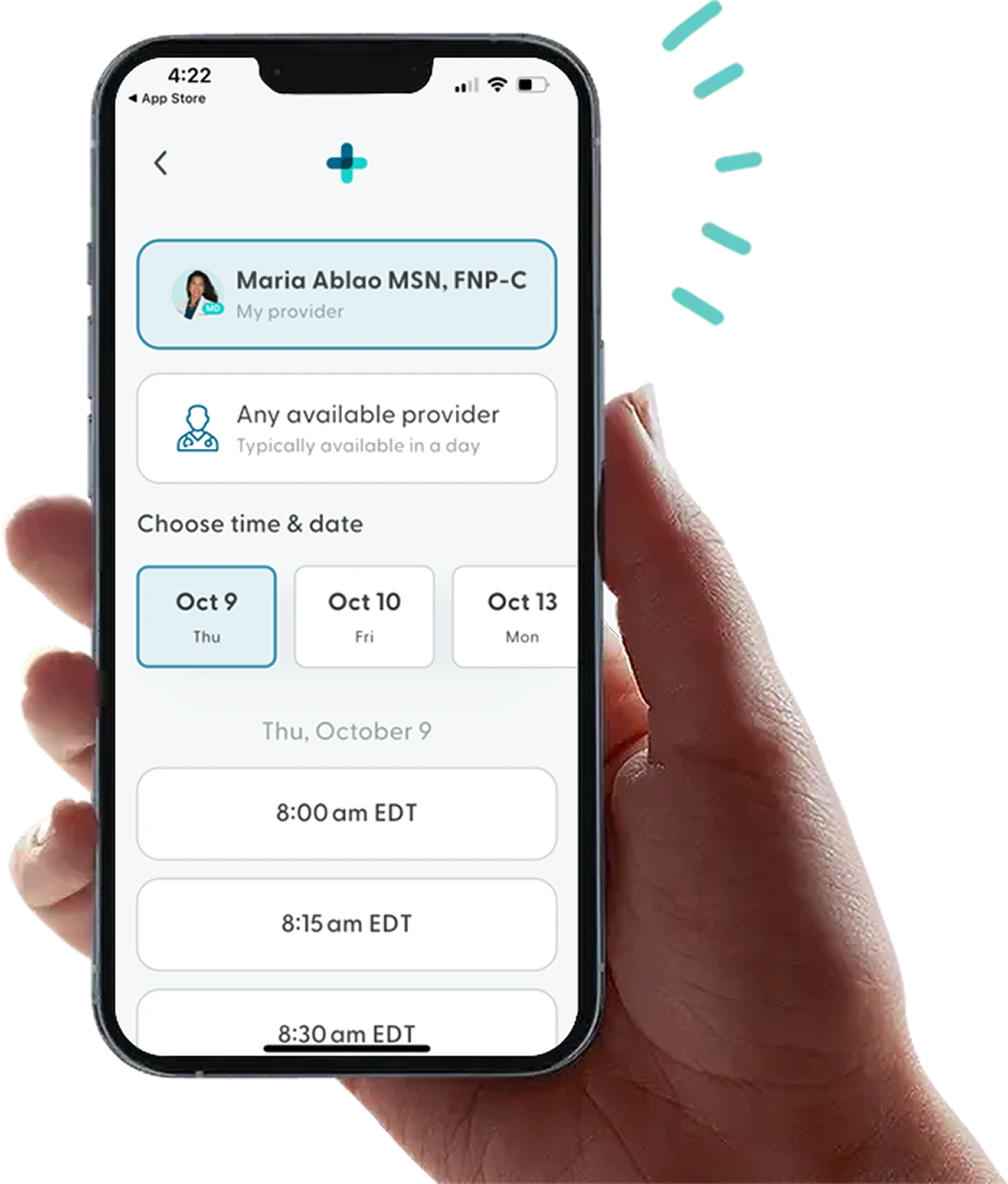Understanding the Differences Between Fasting and Calorie Restriction
Calorie restriction and fasting are two popular dietary strategies with a number of potential benefits.
These methods may be effective for weight loss, improving cognitive function, and enhancing your overall well-being – when implemented correctly.
However, there are a few differences between the two processes that are essential to understand.
In this article, we’ll take a closer look at these differences, how each process works, and the results you can expect if you implement them.
Get prescription weight loss medication online.
Find out if you're eligible for GLP-1s, and get started on your weight loss journey for as low as $75/month.


Fasting vs. Calorie Restriction: Key Differences
Fasting and calorie restriction may seem like the same thing, but there are significant differences between them.
Although they rely on a similar strategy — consuming less food — the methods you use to do so aren’t the same.
What is calorie restriction?
This is a dietary approach that involves reducing your daily calorie intake by between 20% and 40% of your regular energy expenditure.
You can typically use online calorie calculators to determine how many calories you should be consuming to lose weight.
These calculators take factors like your body mass index (BMI), current weight, and activity level into account when determining your daily calories.
Counting calories doesn’t require you to remove any specific foods from your diet.
However, you need to be mindful of the nutritional value of the food you eat to ensure that you don’t exceed your daily calorie limit.
For example, you can still eat processed foods, but keep in mind that they may have double the number of calories compared to whole foods.
This means that you can consume fewer calories throughout the day before reaching your limit, which can cause hunger and discomfort.
Benefits of calorie restriction
Weight management: Achieving a calorie deficit is a crucial part of losing weight, and this dietary approach can help you do that.
Promotes healthy cells: Some studies have shown that calorie restriction promotes cellular repair which reduces the risk of age-related diseases and oxidative damage to muscle tissue.
Improves metabolic health: Calorie restriction may reduce inflammation and improve metabolic functions like insulin sensitivity. As these processes improve, it may lower your risk of developing disorders like type 2 diabetes.
Potential risks and considerations
Risk of nutrient deficiencies: Eating too few calories or not consuming enough nutrient-dense foods may lead to deficiencies. This can compromise your immune system and increase your risk of developing illnesses.
Long-term sustainability: Calorie restriction may be challenging, especially once the body gets used to a lower intake. Over time, the body will adjust and you’ll need to decrease your daily calories again to achieve the same results. This can increase the risk of extreme caloric reduction, which may cause eating disorders to develop.
Individual circumstances: The effectiveness of calorie restriction may not be the same for everyone. It can be influenced by your lifestyle, your medications, and any health conditions you may have, so it’s often difficult to determine if a calorie deficit is the right approach for you.
What is fasting?
Fasting involves voluntarily abstaining from eating food and calorie-containing beverages for a specified period of time.
You can typically adjust your fasting and eating window to suit your specific needs, making it a more accessible dietary approach for many people.
There are various different types of fasting methods that you can implement, depending on your lifestyle and individual health goals.
Benefits of fasting
Weight loss: Fasting can help you create a calorie deficit, which may help you lose weight over time. It is also a more natural weight loss strategy that doesn’t require meticulous calorie counting.
Improved metabolism: Some studies suggest that fasting improves your metabolic processes and overall health. This is because fasting can reduce insulin sensitivity, which helps the body increase fat burn, lowers blood pressure, and improves metabolic function.
Increases autophagy: Fasting may prompt autophagy, which is a biological process that removes damaged cells from the body and replaces them with healthy ones. Autophagy helps to keep the body functioning normally and improves your overall well-being.
Potential risks and considerations
Nutritional imbalance: Extended or frequent fasting without proper planning may lead to nutritional deficiencies, which can cause further health complications.
Hunger and discomfort: Fasting can be challenging due to feelings of hunger and discomfort when you can’t eat. These factors may be difficult to manage — especially when you’re just starting out — and they can increase your risk of binge eating.
Individual variability: Fasting may not be a sustainable or effective approach for everyone, especially people with specific health conditions and dietary needs.
How Exactly Does Each Method Work?
Knowing how fasting and calorie restriction work and which physiological processes they trigger is essential for understanding the differences between the two.
Calorie restriction
This approach focuses on creating a deficit between your daily energy expenditure and calories consumed.
Instead of adjusting your meal times — like you do when fasting — restriction simply involves eating less calorie-dense foods and more nutrient-rich options.
Calorie restriction doesn’t rely on specific hormonal changes or metabolic shifts to promote benefits like weight loss.
Instead, the deficit you create and the food options you choose promote a healthier overall lifestyle.
This is also why calorie restriction is seen as a more gradual and long-term approach to managing your weight and metabolic health.
Fasting
Fasting primarily works by tapping into metabolic and hormonal changes in the body.
During periods of fasting — especially following extended fasts or an intermittent fasting diet — the body’s primary source of energy shifts from food to stored reserves.
This transition triggers a series of physiological responses — including a decrease in insulin levels, which prompts the body to break down fat for immediate energy.
As fasting continues, the body utilizes even more fat reserves for energy, leading to a state of ketosis.
When the body enters ketosis, you may begin experiencing weight loss and higher energy levels. Ketosis may also reduce your risk of developing liver diseases and other chronic health conditions.
Studies show that a calorie deficit triggers a ‘survival’ mechanism in the body that prompts it to get rid of any damaged cells. This helps the body to use its biological functions more efficiently.
What are the Differences in Metabolic Effects?
When comparing the metabolic effects of fasting and calorie restriction, it’s important to understand how each approach influences metabolism, hormones, and cellular processes.
Calorie restriction
Calorie restriction primarily targets your total energy consumption to create a sustained deficit and promote a healthy body weight.
This approach can improve insulin sensitivity — which helps the body to regulate hunger better — and reduces the risk of developing metabolic disorders like diabetes and obesity.
It may also slow your metabolism down, helping you to feel fuller for longer and consume less food over time.
Although a slower metabolism may promote weight loss, it can cause adverse effects if sustained for too long.
These effects include regaining any lost weight and an increased risk of developing metabolic diseases.
That’s why it’s important to adjust your caloric and food intake every two to three months to avoid these health complications.
When you adjust your intake, it’s recommended to consume maintenance calories — or a number equal to your total energy expenditure — for a few weeks.
This resets your metabolism and allows you to create a new calorie deficit after a period of time.
Fasting
Fasting triggers a more significant metabolic effect compared to calorie restriction.
This is because fasting prompts more significant shifts in hormone levels and metabolism, which may have a bigger impact on the body.
During fasting, your insulin (blood sugar) levels may drop significantly, which allows the body to use excess glucose and fat for energy.
Time-restricted eating patterns also stimulate the release of growth hormones that support muscle preservation and tissue repair.
This means you may see changes in your body composition quicker and experience a reduction in sore muscles after working out.
Ready to achieve your weight loss goals?
Shed pounds with GLP-1 medication prescribed online by licensed healthcare providers for as low as $75/month.


Impact on Longevity and Aging
Calorie restriction
Eating fewer calories may slow down various aging processes and increase longevity in adults.
According to recent studies, creating a calorie deficit reduced the aging process of major organs — like the heart, liver, kidney, and lungs — by 2-3%.
This results in a 10-15% reduction in early age-related deaths. Calorie restriction does this by prompting changes at a cellular level in the body.
Fasting
Similar to calorie restriction, fasting may also enhance longevity by slowing down age-related processes in the body.
Research shows that fasting triggers certain biological responses — such as ketosis — that increase the body’s antioxidant levels.
This helps reduce damage to major organs caused by oxidative stress and inflammation, which may increase longevity.
Fasting also promotes various cellular processes that remove or repair damaged tissue in the body. When this happens, aging is slowed down, and the body can function more efficiently.
Should You Get Professional Advice About Fasting and Calorie Restriction?
Seeking professional guidance before implementing either of these dietary approaches is recommended.
Both fasting and calorie restriction can have significant effects on your health, based on your individual circumstances.
Factors like underlying health conditions also contribute to the effectiveness of these strategies.
It’s important to talk to your doctor about new dietary approaches to ensure they won’t have a negative effect on your overall well-being.
Where Can You Learn More About Fasting and Calorie Restriction?
If you’re wondering about the best methods to maintain weight loss or want to know more about calorie restriction and fasting, LifeMD is here to help.
A licensed medical professional can assist you with information and provide guidance on how to effectively implement these methods into your daily routine — all from the comfort of your home.
Make an appointment today to get started.
More articles like this
Feel better with LifeMD.
Your doctor is online and ready to see you.
Join LifeMD for seamless, personalized care — combining expert medical guidance, convenient prescriptions, and 24/7 virtual access to urgent and primary care.

GLP-1
Zepbound® Wegovy® Saxenda®
This is it! Be part of the weight loss movement everyone’s talking about.
Get Started Now
 Medically reviewed and edited by
Medically reviewed and edited by 








